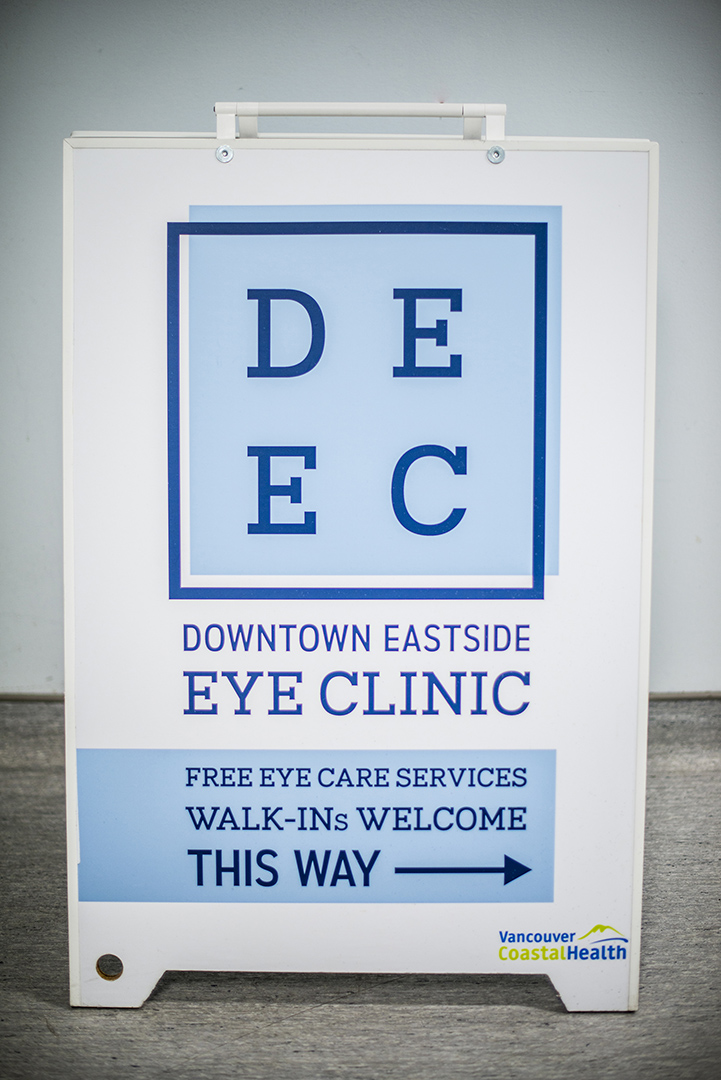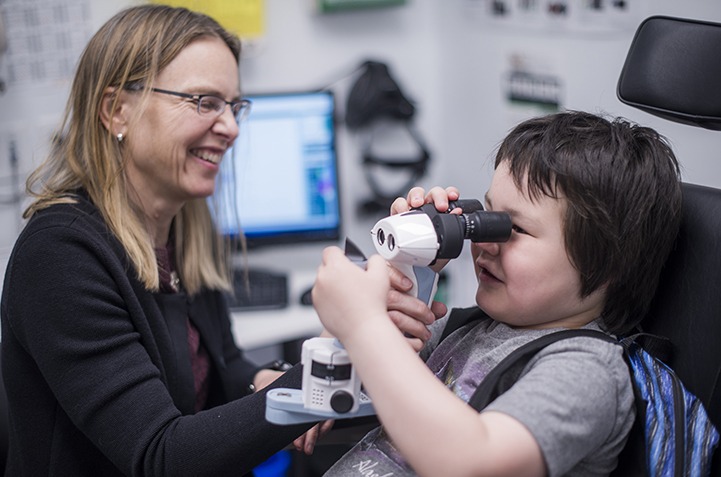By Caroline Dobuzinskis, BC-CfE Communications Coordinator
When an anonymous donor helped the BC Centre for Excellence in HIV/AIDS (BC-CfE) establish a space for marginalized populations in the Downtown Eastside to provide healthcare, the BC-CfE worked with Dr. David Maberley, a highly credentialed ophthalmologist, to include an eye clinic. The Downtown Eastside Eye Clinic (DEEC), located at 623 Powell Street (accessible through the alley of the main building), has since – on an almost daily basis – seen patients who haven’t had their eyes checked in years, if ever.
Dr. Maberley worked closely with the BC-CfE in planning and developing the eye clinic space, whom he cites as being excellent leaders in helping to provide services to marginalized populations. “We are grateful to the BC-CfE for allowing us to be here and we hope they want to work with us for many years to come,” he says.
Dr. Maberley has been providing outreach for most of his career, including at the former location of the DEEC at the Vancouver Native Health Society, VNHS (established in 2000). By offering eye care in an accessible setting, a basic health care service can result in life changing diagnoses and treatment for individuals who may be homeless, under housed or face other challenges. Tamara Loyer first heard about the clinic while she was living in supportive housing. She visited as a form of preventative care and found it to be “in no way intimidating” with very little wait time.
At the time, it was discovered Loyer had a painless tear on her retina that was later corrected through laser eye surgery at St. Paul’s Hospital. She was referred to the hospital’s retina clinic on an urgent basis. “The referral [the DEEC staff] gave to St. Paul’s Eye Clinic, which they arranged, was applauded,” says Loyer. “The treating physician commended the DEEC on catching a few issues that could have – and would have – become serious.”
As part of her assessment, Loyer had optic nerve scan and visual field testing done onsite, and was also given a prescription for eyeglasses, which she received within 24 hours at a nearby optical store. “I know of so many people who don’t get glasses because of the difficulty, cost and wait time to get a simple prescription,” says Loyer.
Loyer’s positive experience in accessing full-circle treatment solutions is exactly what Dr. Maberley envisioned when he helped set up the DEEC, with the support from the BC-CfE. At the original clinic at the VNHS, he sometimes saw patients in doorways and did vision testing in the hallway.
 Entering the new building via a grey door in the back alley, a visitor walks past the Vancouver Coastal Health Connections Clinic, turns right and down the hall to the eye clinic. The spacious DEEC waiting room has a children’s play area and framed photos of street shots taken by Dr. Maberley in the surrounding neighbourhood. Clients are welcome anytime. Bookings are kept to a minimum, ensuring the clinic staff and ophthalmologists can take the time to understand their patients’ needs.
Entering the new building via a grey door in the back alley, a visitor walks past the Vancouver Coastal Health Connections Clinic, turns right and down the hall to the eye clinic. The spacious DEEC waiting room has a children’s play area and framed photos of street shots taken by Dr. Maberley in the surrounding neighbourhood. Clients are welcome anytime. Bookings are kept to a minimum, ensuring the clinic staff and ophthalmologists can take the time to understand their patients’ needs.
Since moving to the new space, the clinic has grown from one to three rooms and acquired state-of-the-art equipment (with the hope of adding equipment for refractive laser eye surgery). Patient volume has increased three to four times, says Dr. Maberley.
“This is a fabulous space. Clients can get assessed, have their eyes imaged, get directed to the right subspecialist, and then they get the proper care with almost no barriers,” says Dr. Maberley.
The move has also attracted more volunteers. Currently around a dozen ophthalmologists and optometrists donate their time and funds coming to the clinic through the BC Medical Services Plan. This includes specialists for glaucoma, cornea, and retina; a pediatric ophthalmologist; and even a doctor who flies in monthly from Smithers, B.C., to help out.
 Dr. Maberley himself has a long history of health outreach, first in northern Canadian communities and then later in inner-city neighbourhoods in New York City. At Queen’s University, he completed a Master’s of Science in Community Health and Epidemiology after medical school at the University of British Columbia. When he was still in high school, he followed his father, also an ophthalmologist, on a trip abroad with Orbis International’s Flying Eye Hospital.
Dr. Maberley himself has a long history of health outreach, first in northern Canadian communities and then later in inner-city neighbourhoods in New York City. At Queen’s University, he completed a Master’s of Science in Community Health and Epidemiology after medical school at the University of British Columbia. When he was still in high school, he followed his father, also an ophthalmologist, on a trip abroad with Orbis International’s Flying Eye Hospital.
“My dad volunteered to assist those with vision loss in the developing world, and I always felt there was also a local need. While we see ourselves as being pretty well off here in Canada, we do have gaps – there is no question,” he says.
